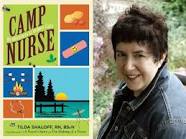
By Tilda Shalof, RN, BScN (Kaplan Publishing)
Reviewed by Elizabeth Hanink, RN, BSN, PHN
Nurse Tilda Shalof says she always wanted to go to camp. As a child she never got the chance, and instead lived vicariously through the camp adventures of her friends. Then, as her own children came of age, she saw a way into the world of camping, trading — as many nurses do — her professional services for camp fees of her boys.
Now, every summer for three weeks at a time, off she goes to commune with nature, care for kids, and watch her own children adjust to life without cell phones and email. You could do this, too, she seems to be saying. Or is she?
It is true that Shalof had no experience in pediatrics when she started out. Her bailiwick is medical-surgical intensive care at Toronto General Hospital. But the judgment and clinical skills, the cool head and empathy that all good nurses possess, are the real requirements. These and an enjoyment of kids, of course, should suffice. Still, as she describes it, camp is not for everyone, not every nurse and not every child — certainly not every camp.
Her first foray into the wilderness was at an enterprise run by a group of people who she thought shared her approach to life. But its free-spiritedness soon collided with her need for safety and order. "Sunscreen! Liquids!" All fell on deaf ears. By the end of her three weeks as the sole professional, she had become a vegetarian so as to avoid food poisoning and, well, survive.
Next summer, her experience at a different camp was much different. Accommodating 850 campers plus hundreds of staff required rules, planning and compliance. It also required other medical staff, people Shalof could learn from and admire. Far from the dilapidated cabins of her first summer, this camp featured wonderful food, sturdy facilities, even an indoor swimming pool.
Many of the the sophisticated, “entitled” campers, however, were on regular and prn meds common to the “worried well.” The heavy schedule of the camp left little down time for anyone, and while this might be just what some were looking for, it worked havoc on others. Shalof’s prose captures the poignancy of children who “fail” at swimming or social skills, who have been shunted to camp by warring parents, or who simply do not like the outdoors.
Finally, though, Shalof found her niche — a camp with children from all backgrounds, of all abilities. Some had physical or psychological problems, some were just different. But here, everyone fit in. The camp was big enough to require a doctor and another nurse, a real source of support to Shalof. But the camp was small enough to forego regimentation.
There was a religious sensibility that gave order to the week and foundation to the principles that guided the camp. Even though she did not share all these convictions, she saw their value to the campers and, at times, to herself.
Not everyone is cut out to be a camp nurse, but if the idea has ever crossed your mind, read this book. Shalof’s experience will help you get an idea of what to look for (and avoid).
Elizabeth Hanink, RN, BSN, PHN is a freelance writer with extensive hospital and community-based nursing experience.